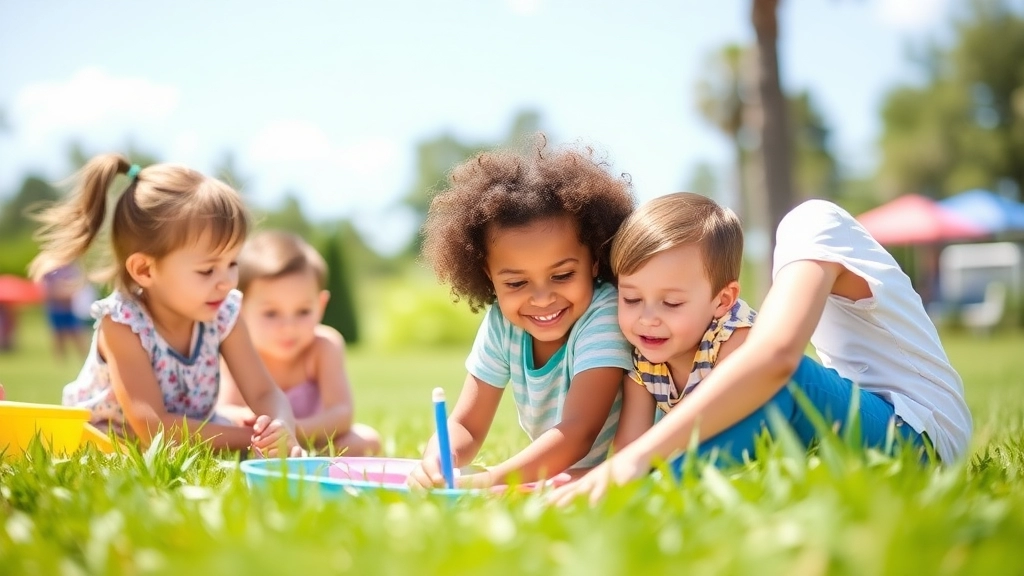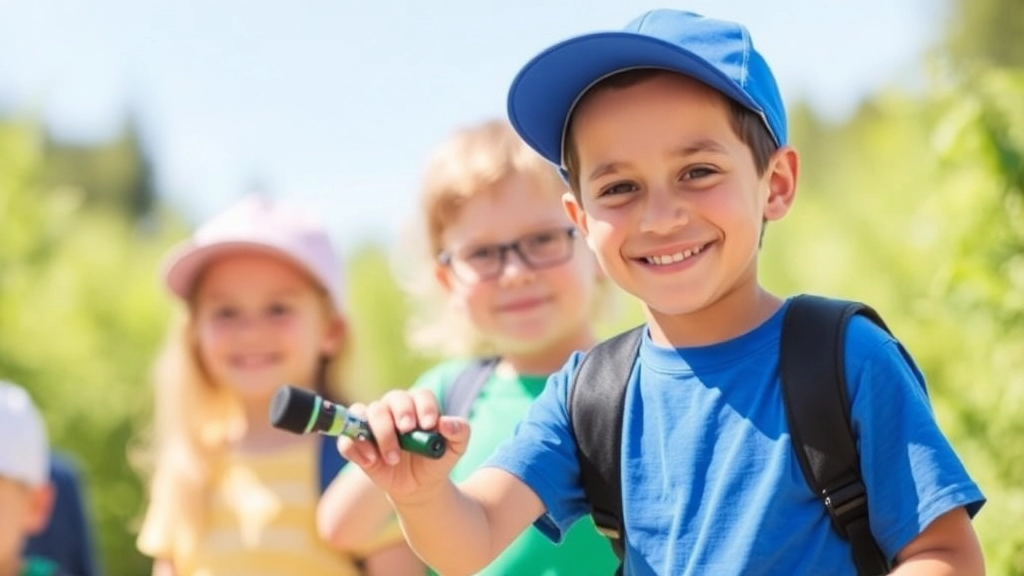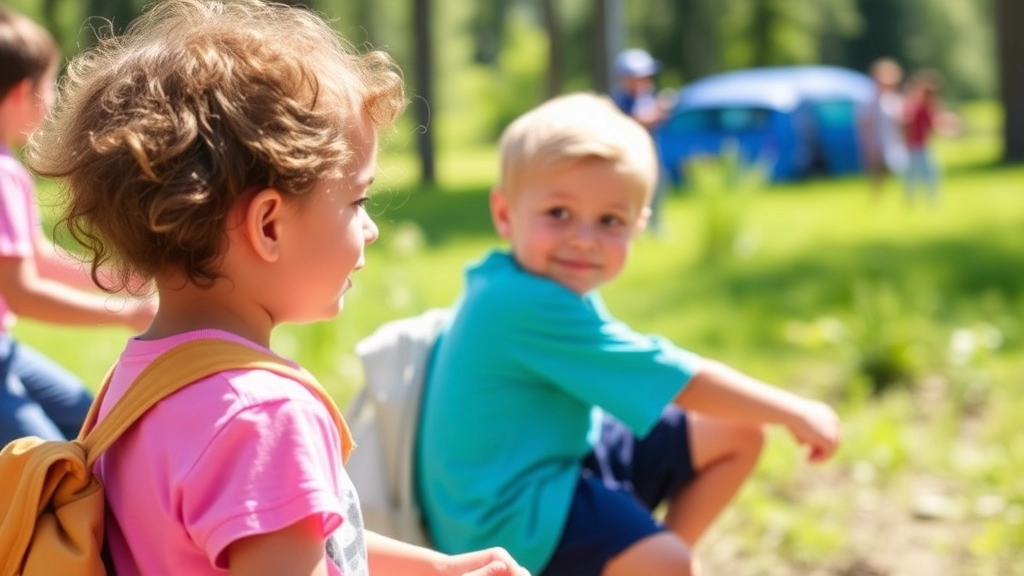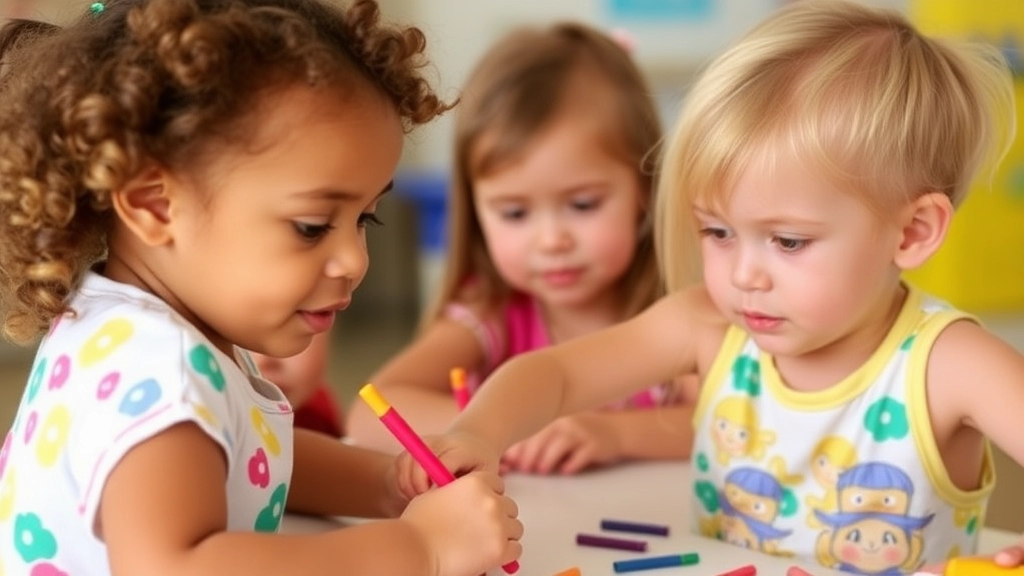Benefits of Summer Camp Preschool Programs
Are you considering enrolling your child in a summer camp preschool program but unsure if it’s the right choice? In this article, we’ll explore the myriad benefits of these programs, from boosting social skills to fostering independence. We’ll also delve into the key activities and curriculum offered, ensuring your child not only has fun but also learns valuable skills. If you’re worried about safety and staff qualifications, we’ve got you covered with essential tips on what to look for. Plus, we’ll provide practical advice on how to prepare your child for this exciting adventure, ensuring a smooth transition for both you and your little one.
Choosing the Right Summer Camp
Choosing the right summer camp for your preschooler can be overwhelming, but it doesn’t have to be. We’ll guide you through the process, from understanding the importance of a well-rounded curriculum to ensuring the camp meets stringent safety standards. You’ll also find answers to frequently asked questions, helping you make an informed decision. So, whether you’re a first-time camp parent or looking to switch things up, this comprehensive guide will equip you with all the information you need to make the best choice for your child’s summer experience.
Overview of Summer Camp Preschool Programs
Alright, let’s dive straight into it. Summer camp preschool programsâwhat’s the deal? If you’re a parent, you’ve probably asked yourself, âIs a summer camp really necessary for my preschooler?â The short answer: absolutely. The long answer: let’s break it down.
What Are Summer Camp Preschool Programs?
Summer camp preschool programs are designed to provide young children with an enriching, fun, and educational experience during the summer months. These camps are tailored specifically for preschool-aged children, typically ranging from 3 to 5 years old.
Why Consider a Summer Camp for Your Preschooler?
You might be thinking, “My kid is so young. Do they really need a structured summer camp?” Here’s the thing: these programs aren’t just about keeping your child busy. They offer a ton of benefits, which we’ll get into later. For now, let’s focus on what these camps look like.
What Do These Programs Offer?
Think of it as a blend of play, learning, and social interaction. Summer camp preschool programs usually include:
- Creative Activities: Arts and crafts, music, and dance sessions to spark creativity.
- Outdoor Fun: Plenty of physical activities like games, sports, and nature walks to keep them active.
- Educational Content: Basic academic skills like numbers, letters, and simple science concepts, but in a playful manner.
- Social Skills Development: Group activities that encourage teamwork, sharing, and making new friends.
Real Concerns Addressed
I get itâsending your preschooler to a summer camp can be nerve-wracking. You might worry about their safety, whether they’ll fit in, or if they’ll even enjoy it. Here’s a quick tip: research is your best friend. Look for camps with excellent reviews, qualified staff, and a solid curriculum.
What’s Next?
We’ll dive deeper into the benefits of enrolling your preschooler in a summer camp in the next section. Spoiler alert: it’s more than just fun and games. Stay tuned to discover how these camps can actually boost your child’s development.
For more information on how to choose the best camp for your child, check out our guide on STEM summer camps. If you’re curious about activities that can keep your little ones engaged, don’t miss our article on summer camp activities.
Benefits of Enrolling in Summer Camp for Preschoolers

Ever wondered if summer camp is worth it for your preschooler?
Let’s dive in.
Why Summer Camp?
First off, it’s a game-changer for your child’s growth.
Here’s why:
- Social Skills: Kids learn to share, take turns, and make friends. All those crucial life skills.
- Independence: Being away from home helps them become more self-reliant.
- Physical Activity: Camps get kids moving. No couch potatoes here.
- Creativity: From arts and crafts to imaginative play, creativity gets a big boost.
- Routine: Keeps a structured routine during the summer break. No more hearing “I’m bored!”
Real Stories, Real Impact
Take Sarah, for example. She was shy and struggled with making friends. After a summer camp experience, she came back more confident and socially active. Her parents were amazed at the transformation.
What’s in it for You?
- Peace of Mind: Knowing your child is in a safe, engaging environment.
- Me-Time: A few hours to yourself. Finally, time to catch up on that book or get some work done.
- Skill Development: It’s not just play. Camps often sneak in educational elements.
Why It’s a No-Brainer
- Short-Term Commitment: It’s just for the summer. No long-term contracts.
- Affordable: Many camps offer flexible pricing and scholarships.
- Happy Kids, Happy Parents: A tired, happy kid at the end of the day is worth its weight in gold.
Bullet Points for Quick Skimming
- Social Skills: Sharing, taking turns, making friends.
- Independence: Self-reliance through being away from home.
- Physical Activity: Keeps them active and healthy.
- Creativity: Boosts imagination and creative thinking.
- Routine: Maintains a structured schedule.
Key Activities and Curriculum Offered
When considering a summer camp for your preschooler, you might be wondering: What exactly will my child be doing all day? Will it be fun? Will they learn anything? Let’s dive into the key activities and curriculum offered at these camps to put your mind at ease.
What Do Preschoolers Do at Summer Camp?
Summer camps for preschoolers are designed to be engaging, educational, and loads of fun. Here are some common activities your child might experience:
- Arts and Crafts: Think painting, drawing, and creating with different materials. It’s all about letting their imagination run wild.
- Outdoor Play: Camps often include activities like nature walks, scavenger hunts, and playground time. It’s all about fresh air and movement.
- Music and Dance: From singing songs to rhythmic dancing, these activities help kids express themselves and develop coordination.
- Story Time: Engaging tales that spark imagination and improve listening skills. Sometimes, there’s even a bit of role-playing involved.
- Science Experiments: Simple, hands-on experiments that introduce basic scientific concepts in a fun way.
- Water Play: Splashing around in safe, supervised environments. Perfect for those hot summer days!
Curriculum Focus
Preschool summer camps often have a curriculum that balances fun and learning. Here’s what you can expect:
- Social Skills Development: Learning to share, take turns, and work in groups is a big part of camp life.
- Language Skills: Through songs, stories, and conversations, kids expand their vocabulary and improve communication.
- Motor Skills: Activities like climbing, running, and crafting help develop both fine and gross motor skills.
- Cognitive Skills: Puzzles, games, and problem-solving activities challenge their thinking and creativity.
How Do You Choose the Right Activities?
With so many options, how do you ensure the activities are right for your child? Here are a few tips:
- Know Your Child’s Interests: Does your child love painting or are they more of a little scientist? Choose camps with activities that match their passions.
- Check the Balance: Look for a mix of structured and free play. Both are crucial for development.
- Ask About Themes: Some camps have weekly themes, which can be exciting and keep things fresh.
Real Concerns, Real Solutions
You might worry if your child will fit in or if they’ll be safe. Rest assured, most camps are well-equipped with trained staff who know how to engage young kids in a safe environment.
Choosing the Right Summer Camp for Your Child

Worried about finding the perfect summer camp for your preschooler? You’re not alone.
We all want the best for our kids, but with so many options, it can feel like a maze.
Let’s break it down.
First things first: What do you want for your child?
Think about what you want your child to get out of the camp.
Here are some questions to ask yourself:
- Does your child love the outdoors?
- Are they into arts and crafts?
- Do they need a bit of academic boost?
Next up: Research
You gotta do your homework.
Start with a quick Google search.
Look for camps in your area.
Check out their websites.
Key things to look for:
- Curriculum: What activities do they offer? Are they aligned with your child’s interests?
- Reviews: What are other parents saying? Look for reviews on Google, Facebook, or parenting forums.
- Staff Qualifications: Who’s running the show? Are the staff members qualified and experienced?
Visit the Camp
If possible, visit the camp.
See it with your own eyes.
- Facilities: Are they clean and safe?
- Staff Interaction: How do the staff interact with the kids? Are they friendly and engaging?
Ask Questions
Don’t be shy.
Ask as many questions as you need.
Here are some to get you started:
- What’s the staff-to-child ratio?
- What safety measures are in place?
- How do they handle emergencies?
Trust Your Gut
At the end of the day, trust your instincts.
If something feels off, it probably is.
Get Recommendations
Talk to other parents.
Word of mouth is gold.
Your friends and family might know the perfect camp you haven’t even considered.
Check for Flexibility
Life happens.
Make sure the camp is flexible with schedules and cancellations.
Safety and Staff Qualifications in Preschool Camps
Alright, let’s dive into what really matters when picking a preschool summer camp: safety and staff qualifications. As a parent, you’re probably asking, âHow do I know my child will be safe?â and âAre the staff qualified to handle a bunch of energetic preschoolers?â These are the real questions keeping us up at night, right?
Why Safety is Non-Negotiable
First off, safety isn’t just a checkboxâit’s the whole foundation. When you’re choosing a camp, you’re trusting someone else with your child’s wellbeing. Here’s what you need to look for:
- Secure Facilities: Check if the camp has secure, child-friendly spaces. Fenced playgrounds, locked gates, and CCTV cameras are a must.
- Emergency Plans: Ask about their emergency protocols. Do they have fire drills? Is there a plan for medical emergencies?
- Health Protocols: Especially post-pandemic, camps should have clear health guidelines. Regular sanitation and health checks are key.
Staff Qualifications: Who’s Watching Your Kids?
Now, let’s talk about the folks who’ll be spending the day with your child. You want to know they’re not just warm bodies but trained professionals.
- Certified Professionals: Look for camps with staff holding certifications in early childhood education. They should know how to engage and educate preschoolers.
- First Aid Training: Every staff member should be first aid and CPR certified. It’s non-negotiable.
- Background Checks: Ensure all staff undergo thorough background checks. Peace of mind comes from knowing your child is in safe hands.
Real-Life Example: What a Good Camp Looks Like
I remember visiting a camp where they had an open day. They proudly showed off their staff qualifications and safety measures. Parents could see first-hand how staff interacted with kids and how safety was their priority. It was like a breath of fresh air.
Questions to Ask
When you’re visiting potential camps, arm yourself with these questions:
- How do you handle accidents or injuries?
- What’s the staff-to-child ratio?
- Can you walk me through a typical day?
If you’re looking for a camp that balances fun and safety, check out the Primrose Summer Camps for an excellent example. Additionally, the ZKids Summer Camp is another great option that ensures a safe and enriching environment for your child.
Tips for Preparing Your Child for Summer Camp

Worried about sending your little one off to summer camp?
You’re not alone.
Lots of parents feel the same way.
But don’t stress—I’ve got some tips to make the transition smooth.
Start with the Basics
First things first, talk to your child about what to expect.
Describe the camp, the activities, and the daily routine.
Pack Smart
Make a checklist of essentials:
- Comfortable clothes
- Sunscreen
- Water bottle
- Favourite toy or blanket for comfort
Visit the Camp Beforehand
If possible, take your child to see the camp.
A little preview can ease a lot of anxiety.
Role-Play Scenarios
Practice common camp situations at home.
Things like:
- Making new friends
- Asking for help
- Following instructions
Boost Independence
Encourage your child to do small tasks on their own.
This could be as simple as:
- Dressing themselves
- Packing their own bag
- Tidying up toys
Stay Positive
Your attitude sets the tone.
Speak positively about the camp experience.
Communicate with Camp Staff
Get to know the staff.
Share any special needs or concerns your child might have.
Create a Goodbye Ritual
A consistent goodbye can make drop-offs easier.
A special hug or a secret handshake works wonders.
Keep in Touch
Many camps provide updates.
Use these to reassure your child that you’re thinking of them.
Prepare for the Unexpected
Sometimes things don’t go as planned.
Have a backup plan for emergencies.
Got any more questions?
Check out our FAQ section for more insights.
Frequently Asked Questions About Preschool Summer Camps
Are preschool summer camps worth it?
Absolutely.
Parents often worry if it’s worth the investment.
But think about itâyour child gets to learn, play, and socialise in a structured environment.
They’ll come back with stories, new friends, and maybe even a few new skills.
What should I pack for my child’s summer camp?
Great question.
Packing can be a headache, but it doesn’t have to be.
Here’s a quick list:
- Change of clothes: Kids get messy.
- Sunblock: Protect that delicate skin.
- Snacks: Always pack extra.
- Water bottle: Hydration is key.
- Comfort item: A small toy or blanket can make a big difference.
For a detailed guide, check out our Summer Camp Packing List.
How do I know if the camp staff are qualified?
This is crucial.
Look for camps that boast qualified staff.
Ask about their qualifications and experience.
Most reputable camps will proudly share this info.
Don’t be afraid to dig deeper.
What if my child doesn’t like the camp?
It’s a common worry.
Most camps offer a trial period or flexible enrolment options.
Talk to the camp director about your concerns.
They usually have strategies to help kids adjust.
Are there any safety measures in place?
Safety is non-negotiable.
Check if the camp follows standard safety protocols.
Ask about first aid, emergency plans, and staff-to-child ratios.
A good camp will have all this info ready for you.
For more on safety, explore our Summer Camp Safety Guide.
How do I prepare my child for their first camp?
Preparation is key.
Start by talking to them about what to expect.
Visit the camp together if possible.
Here are a few more tips:
- Practice separation: Short periods away from you can help.
- Role play: Act out camp scenarios.
- Pack together: Let them choose some items to bring.
What if my child has special needs?
Many camps are inclusive.
Look for camps that specifically mention accommodations for special needs.
Talk to the staff about your child’s requirements.
A good camp will work with you to ensure a positive experience.
How much does a preschool summer camp cost?
Costs can vary.
Typically, you’ll find a range from affordable community programs to pricier private camps.
Check if they offer scholarships or sliding scale fees.
Can I visit the camp before enrolling?
Definitely.
Most camps encourage visits.
Take a tour, meet the staff, and see the facilities.
It’ll give you peace of mind and help you make a more informed decision.
FAQs About Summer Camp for Preschoolers
What are the main benefits of enrolling my preschooler in a summer camp?
Summer camp can significantly boost your child’s social skills, independence, physical activity, creativity, and help maintain a structured routine during the summer break.
How can summer camp help my child develop social skills?
Being in a group setting allows children to learn essential social skills such as sharing, taking turns, and making friends, which are crucial for their overall development.
Is summer camp only about play, or are there educational elements as well?
Many summer camps incorporate educational elements into their activities, so your child can have fun while also learning new skills and concepts.
What should I look for when choosing a summer camp for my preschooler?
Key factors to consider include the camp’s curriculum, reviews from other parents, and the qualifications of the staff. Visiting the camp and observing the facilities and staff interactions can also be very helpful.
How can I prepare my child for their first summer camp experience?
Start by talking to your child about what to expect, packing essential items, visiting the camp beforehand, and role-playing common camp scenarios to ease their anxiety.
What if my child has special needs or concerns?
It’s important to communicate any special needs or concerns with the camp staff to ensure they can provide the best care and support for your child.
Are summer camps affordable?
Many camps offer flexible pricing and scholarships, making it easier for families to afford the experience. It’s worth researching different options to find one that fits your budget.
How can I ensure the camp is safe for my child?
Look for camps with a good staff-to-child ratio, robust safety measures, and a clear plan for handling emergencies. Visiting the camp and asking detailed questions can also provide peace of mind.
What should I pack for my child’s summer camp?
Essential items include comfortable clothes, sunscreen, a water bottle, and a favorite toy or blanket for comfort.
Is it normal to feel anxious about sending my child to summer camp?
Yes, it’s completely normal to feel anxious. Many parents share the same concerns, but proper preparation and communication with the camp staff can help alleviate these worries.
References
-
Benefits of Summer Camp for Kids
-
How to Choose the Best Summer Camp for Your Child
-
How to Prepare Your Child for Summer Camp

